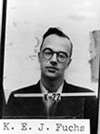Red Spy Steals U.S. Atom Bomb Secrets
October 18, 2007 - 8:46 am - Posted by iDunzo
 October 18, 1945: Klaus Fuchs passes U.S. atomic bomb secrets to the Soviet Union for the first time.
October 18, 1945: Klaus Fuchs passes U.S. atomic bomb secrets to the Soviet Union for the first time.
Between 1945 and 1947, working with a courier known only as Raymond, Fuchs delivered high-level information on the atomic bomb, then later the hydrogen bomb, to Moscow.
Fuchs was a refugee from Hitler’s Germany, fleeing to England in 1933, where he completed his doctorate in physics.
At the outbreak of World War II, Fuchs, still a German citizen, was interned as an enemy alien but soon released through the intervention of Max Born, a professor at Edinburgh University and another German refugee.
Fuchs was recruited as a theoretical physicist for the British atomic bomb project, and became a British subject in 1942.
The following year, he was among several British scientists sent to the United States to collaborate on the Manhattan Project.
After being sent to the weapons laboratory in Los Alamos, New Mexico, Fuchs spent his time devising a method of imploding the fissionable core of the plutonium bomb.
He was present at the Trinity test in July 1945, where an atomic bomb was successfully detonated for the first time.
Through it all, however, Fuchs remained a committed communist. He had joined the party while still living in Germany and fled the country for his political beliefs, not his religion. He was a Lutheran.
Consequently, he had tremendous sympathy for the Soviet Union and its life-and-death struggle with Nazism.
He also had grave misgivings about the United States being the only power on earth to possess the bomb.
By 1948, the Americans were aware that the Russians had people inside their nuclear program but Fuchs eluded suspicion until the following year, by which time he had returned to England.
Confronted by British intelligence, which identified him after cracking a Russian code, he eventually confessed and was sentenced to 14 years in prison.
Following his release in 1959, Fuchs went to East Germany and lived there until his death in 1988.
Historians on both sides of the Cold War have long debated the actual value to the Russians of Fuchs’ information.
Asked after Fuchs’ death about the importance of what he had given the USSR, Edward Teller said:
“Oh, not very important. I’m sure the Russians knew how to build a bomb without Fuchs’ stuff.”
Sources: Atomicarchive.com and Crimelibrary.com
